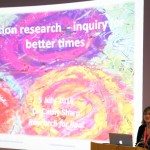As action researchers our approach is appreciative, collaborative, experiential and future-focused. We undertake our work with people, not on them, or for them.
Action research is a large ‘extended family’ of approaches to inquiry that includes appreciative inquiry, action learning, action inquiry, participatory research, systemic action research and design methodologies. Such ‘action inquiry’ is about helping others to ask good questions, and crucially, to keep doing so, to deal with the ever changing and complex situations in which we find ourselves.
We provide a range of support to build the  confidence and capacity of people to develop inquiry as a process of ‘learning in action’ to sustain and improve on the best of the work they are already engaged in – to build on the best of the ‘here and now’.
confidence and capacity of people to develop inquiry as a process of ‘learning in action’ to sustain and improve on the best of the work they are already engaged in – to build on the best of the ‘here and now’.
Such inquiry helps to generate a dialogue about what we ought to be doing to tackle the many complex issues that we face and can help to promote better partnership working, leadership at all levels and participation in service co-design and evaluation.
We have an established track record of delivery of high quality, thoughtful and practical action research and consultancy projects. We’re interested in how to support individual, organisational and community level learning by building different types of action inquiry processes into ways of working and every day, ‘live’ practice.
Our perspectives are informed by our knowledge of health and social care, community development, regeneration, public participation, health improvement, co-production and community resilience.
From across this wide-ranging work, we are aware of the real practical challenges of embedding a new ethos of public service co-design and delivery that recognises existing capacities, involves people in decision-making about what is right for them, enhances their resilience, recognises the value of the expertise of both the staff and people that use services and encourages working together to find shared solutions.
We have expertise in group coaching and facilitation, social research and evaluation methodologies that can help to promote useful and high quality qualitative, quantitative and participatory research and evaluation, with a focus on learning.
We facilitate small and large group processes and help you to find ways to maximise the participation of key stakeholders, professionals and community members at all stages of the process.
“What struck me was the seamless flow of things…..it didn’t seem like hard work, probably because we started off story telling, but also the hard thinking was there too. The real engagement is invigorating.”
We use and adapt innovative methods to draw on the rich experience and expertise already available within organisations and communities and to help people make sense for themselves of what each of them know, bringing in multiple perspectives to the inquiry process and testing wider resonance.
Forming New Futures Through Appreciative Inquiry, IRISS Insight No 33, By Cathy Sharp, Belinda Dewar and Karen Barrie, August 2016 This short report revisits Appreciative Inquiry and suggests that, as an approach to action research, it offers a powerful contribution to meeting the appetite for real change that is evident across public services in Scotland. More mature understandings of appreciative inquiry, beyond a simplistic focus on positivity, can help to us to see old issues in new ways and offer fresh and welcome ways to challenge the status quo. Appreciative inquiry is both a personal and professional practice that has many applications across health and social care. This includes working with individuals or groups of people including staff and people that use services. This Insight provides some examples and highlights some of the practices, strengths and limitations of the approach.
IRISS have also published an IRISS FM roundtable discussion on the topic of Appreciative inquiry (AI). This discussion covers in some detail what AI is and how it has been used in health and social care. Participants include the authors of the evidence summary – Cathy Sharp (Research for Real) and Belinda Dewar (University of the West of Scotland); as well as Alison Upton (SSSC) and Robin Jamieson (SCDC). Kerry Musselbrook (Iriss) introduces and chairs the discussion.
